

  |
|
|
||||||||||||||||||||||
|
FMS FEATURE... March 1, 2018 Oscar in Concert Motion Picture Academy joins L.A. Phil in tribute to film music past, present and future by Jon Burlingame 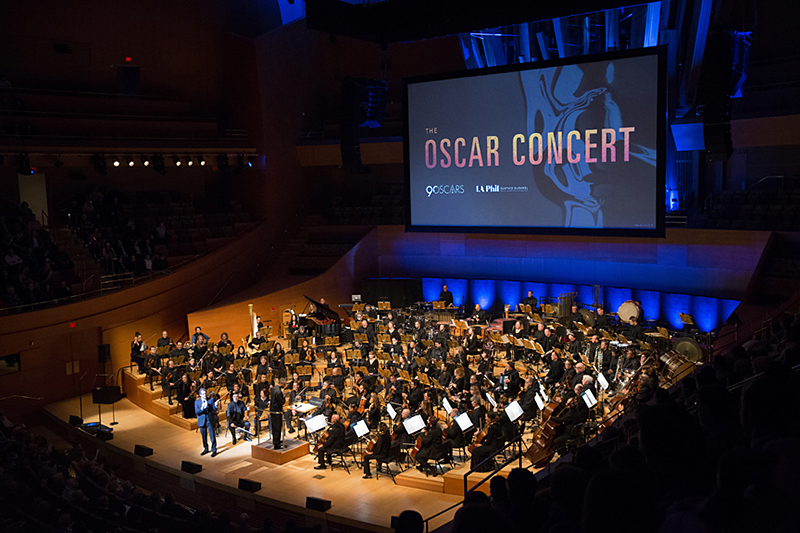 Michael Giacchino with conductor Thomas Wilkins and the Los Angeles Philharmonic. Imagine film music by 22 different composers, spanning 79 years of movie history, played by this world-class orchestra with four different conductors – augmented by such offbeat instruments as accordion, mandolin, sitar, erhu and synthesizers – and performed while imagery from many films was projected on a screen above. The content ranged from classically symphonic to jazz to hybrid orchestra-with-electronics, and each piece was introduced by a major actor or director. This was the second Academy of Motion Picture Arts & Sciences-sponsored concert of Oscar-nominated music prior to the annual ceremony (the other was in 2014) but the first to be performed by the Philharmonic at Disney Hall. It consisted not only of excerpts from all five of this year's nominated scores but also suites from great movie music of the past. 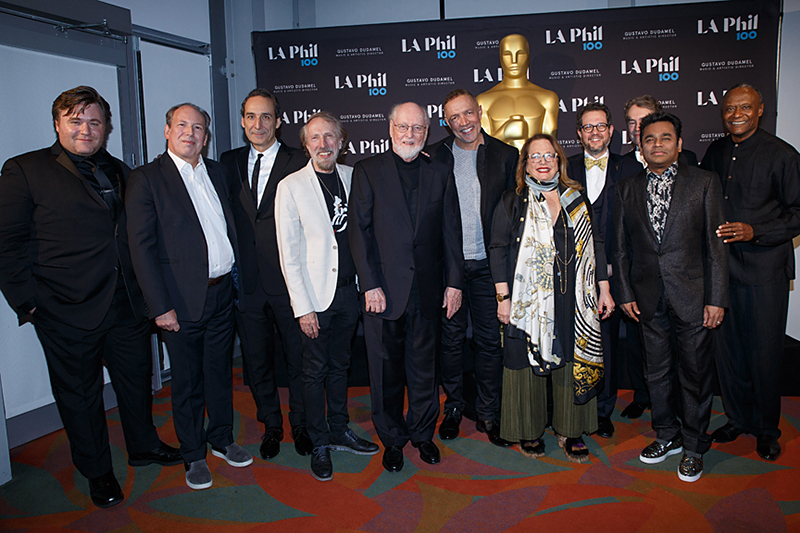 (From left) Benjamin Wallfisch, Hans Zimmer, Alexandre Desplat, Charles Bernstein, John Williams, Michael Abels, Laura Karpman, Michael Giacchino, Carter Burwell, A.R. Rahman, and Thomas Wilkins. At 13 minutes, this segment was a little long but helped the audience understand the challenges that a film composer faces on a regular basis. The remainder of the concert's first half consisted of five suites, each featuring music from three or four films, and each built around a different literary theme. Indian composer A.R. Rahman introduced the first, "The Sound of Home," which had music by Rachel Portman (Nicholas Nickleby, 2002), Nino Rota (Amarcord, 1973) and Rahman (Slumdog Millionaire, 2008). "Home is often not a place, but a state of mind," Rahman said, and the variety of clips (from The Color Purple and Dances With Wolves to The Sound of Music) illustrated this nicely. Throughout the concert, both the music and the clips emphasized inclusiveness, especially of women and people of color. As another Academy music-branch governor, Laura Karpman, noted later in the concert, their vision is one of "a future of increasing diversity and equality of opportunity." Chilean actress Daniela Vega (A Fantastic Woman) introduced the second suite, "The Sound of Love," including Oscar-winning music by Erich Wolfgang Korngold (The Adventures of Robin Hood, 1938), Luis Bacalov (Il Postino, 1994) and Tan Dun (Crouching Tiger, Hidden Dragon, 2000). Clips ranged from West Side Story and Casablanca to The English Patient and An American in Paris. A third Academy governor, Charles Bernstein, introduced Get Out composer Michael Abels, an appropriate choice for "The Sound of Fear," including music by Mica Levi (Jackie, 2016), Quincy Jones (In Cold Blood, 1967), John Carpenter (Halloween, 1978) and John Williams (The Witches of Eastwick, 1987). This clip montage was especially fun, and it was extraordinary to hear eight percussionists banging out Jones' Oscar-nominated, jazz-meets-classical score – believed to be its live-performance debut – against clips that ranged from Jaws and Psycho to Rebecca and The Shining. "The Sound of the Chase" was introduced by actress Michelle Rodriguez (The Fast and the Furious), who in turn introduced composer Lalo Schifrin, whose music from the 1968 classic Bullitt was the centerpiece of the suite; Dave Grusin (The Firm, 1993) and Jerry Goldsmith (The Great Train Robbery, 1978) were also featured. Clips showcased several classics of the genre including The French Connection, North by Northwest and Raiders of the Lost Ark. 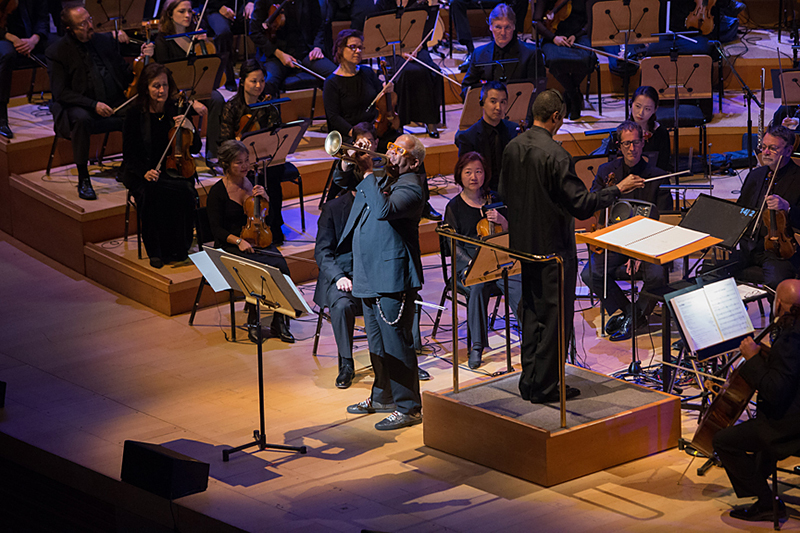 Terence Blanchard solos from Malcolm X. The second half consisted entirely of excerpts from this year's score nominees. Directors Martin McDonagh (Three Billboards Outside Ebbing, Missouri) and Christopher Nolan (Dunkirk) introduced their composers via video, while Guillermo Del Toro (The Shape of Water), Paul Thomas Anderson (Phantom Thread) and Rian Johnson (Star Wars: The Last Jedi) appeared in person. 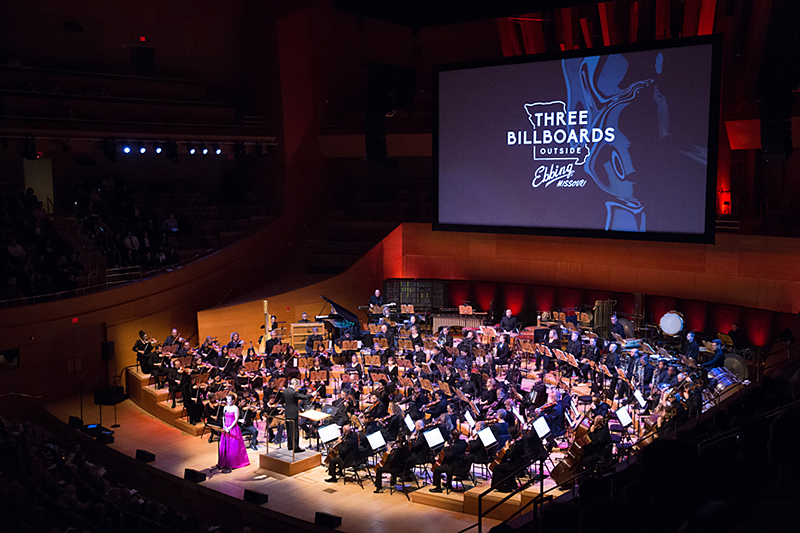 Carter Burwell conducts music from Three Billboards Outside Ebbing, Missouri 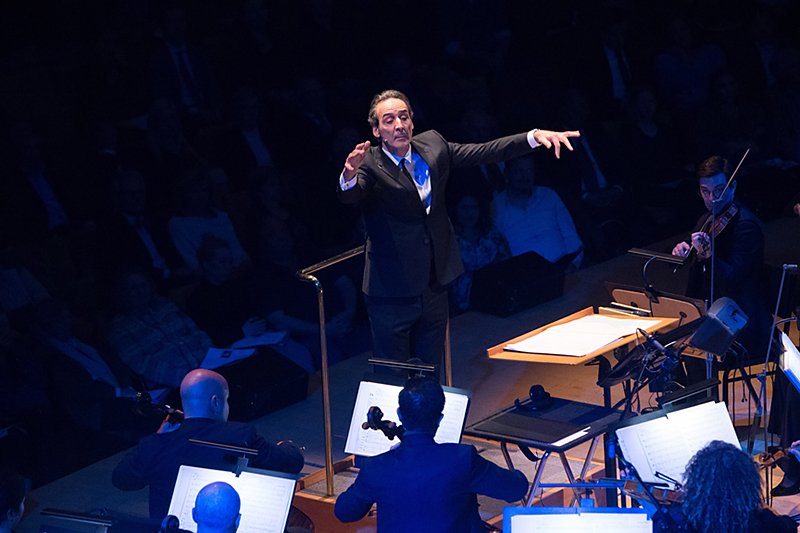 Alexandre Desplat conducts his music from The Shape of Water. Wilkins conducted the string-rich, romantic-piano piece "House of Woodcock" from Phantom Thread (composer Jonny Greenwood was the only absentee among the nominees). Director Anderson said he asked Greenwood to "write some music like Nelson Riddle" even though he knew Greenwood would prefer to write something "atonal and depressing." The evening's biggest cheers were saved for 86-year-old John Williams, who conducted a spirited "The Rebellion Is Reborn" from Star Wars: The Last Jedi. Director Johnson, trying hard not to overpraise the legendary composer, said "he works like a little kid sprinting toward the playground, because that's where the toys are." 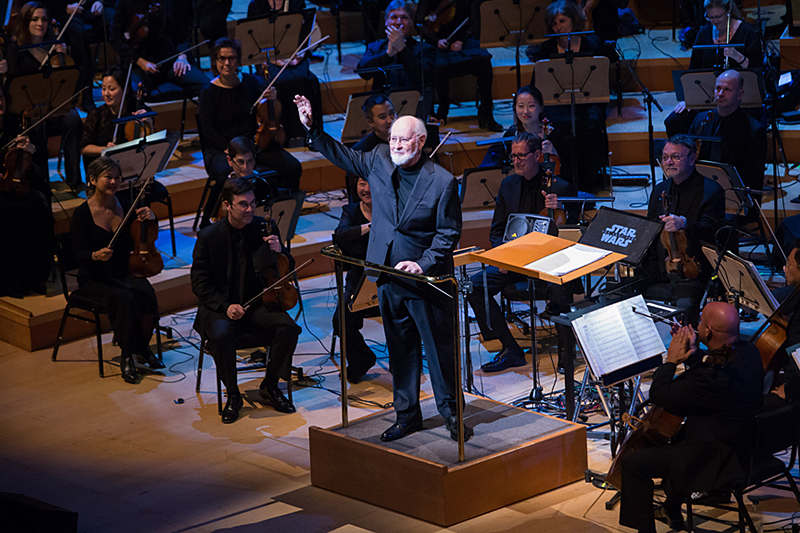 John Williams receives standing ovation. ©2018 Jon Burlingame |
Search
Past Features
|